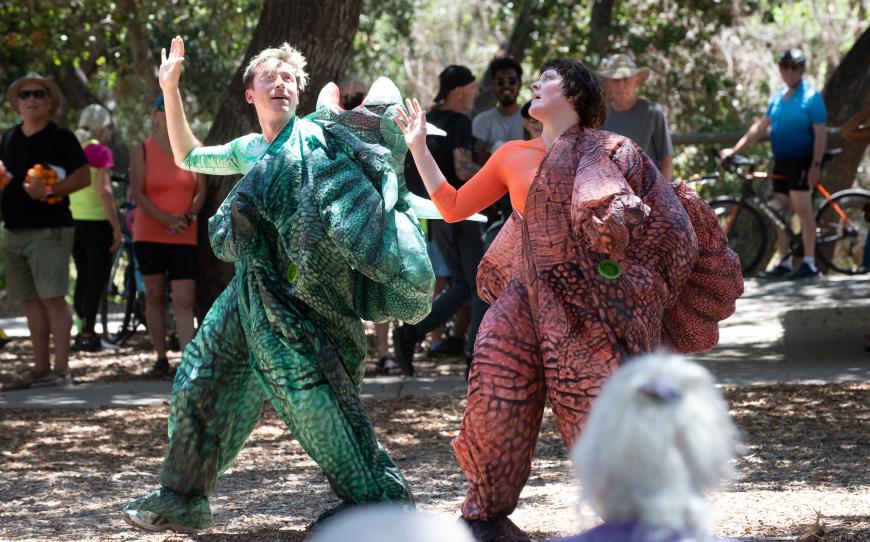
Like the tale of the blind men trying to decipher the vastness of an elephant, the attendees of the 76th-annual Ojai Music Festival were given the challenge of constructing a four-day portrait of the multidisciplinary collective known as AMOC.
The name is a paradoxical acronym. On the one hand it stands for the organization itself — the American Modern Opera Company. At the same time, the word amok (its roots in the language of Malaya) describes a condition, to quote Merriam-Webster, “often born out of too much brooding,” where anything can happen.
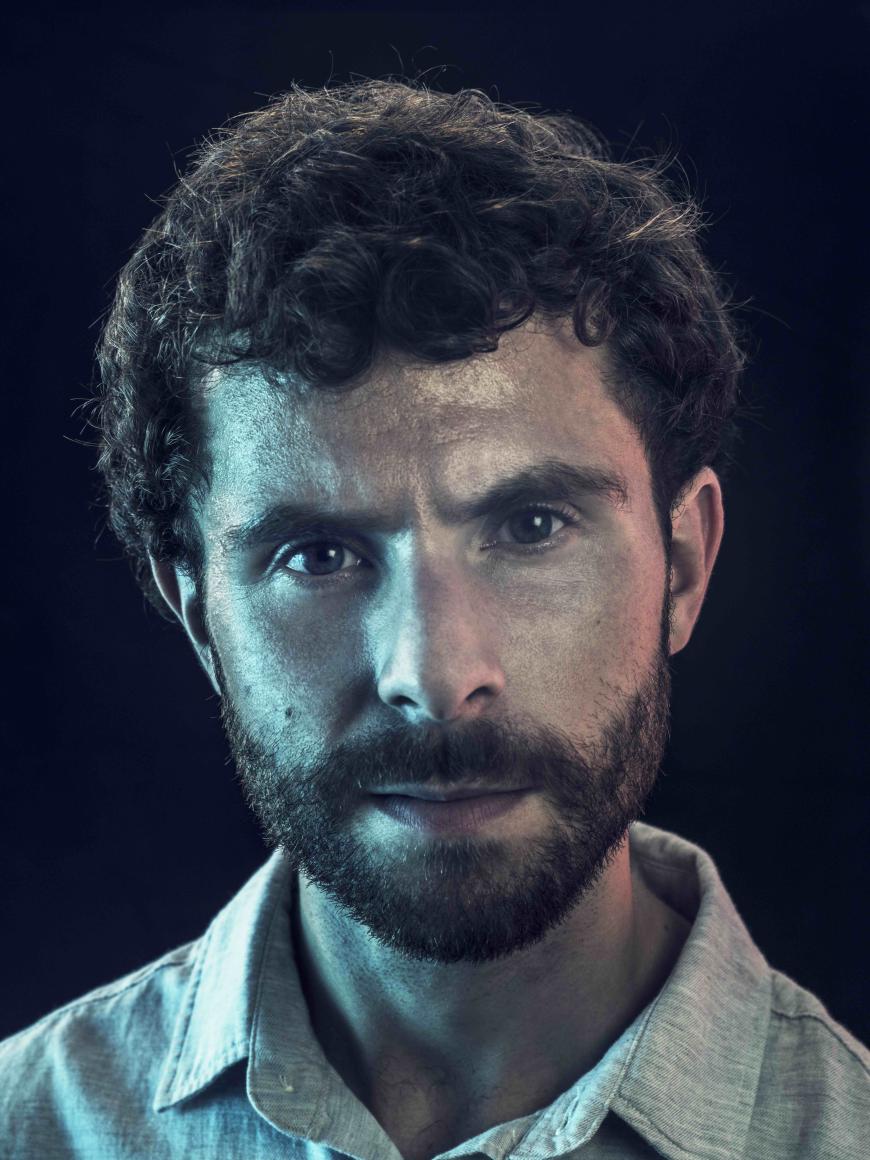
The artistic identity of AMOC (cofounded in 2017 by composer/ musician/ conductor Matthew Aucoin and director/ choreographer/ dancer Zack Winokur) is deeply rooted in a process of collective decision making. Coming together on a farm in rural Vermont, members all have an equal voice. It results in a creative process that Aucoin describes as “deliciously messy!”
Multidisciplinary by design, the exceedingly talented members of AMOC include musicians, dancers, singers, writers, and composers. Its self-described mission is to break down barriers between music, poetry, theater, opera, and dance. As a result, Aucoin told me, the puzzle process of putting together the four full days of Ojai programs “evolved out of hundreds of hours of Zoom meetings.” Even so, no one could have anticipated that at the last minute one of the group’s stars, soprano Julia Bullock, would be forced to cancel when she tested positive for COVID.
Bullock’s loss had a profound impact on the festival that resulted in cancellations and rapidly conceived program changes, including substitute performances by the fine soprano Ariadne Greif. As a result, the first two days of the festival, Thursday and Friday (June 9–10), were decidedly dark and brooding. The one blazing exception was AMOC’s performance of Julius Eastman’s Stay on It (part of an all-Eastman program) that showcased the dynamic talent of bass-baritone Davóne Tines.
It was an all-Bach program Saturday morning — featuring the period-instrument ensemble Ruckus and AMOC’s star flutist, Emi Ferguson — that shifted the mood of the festival 180-degrees. Suddenly, there was a tangible sense of joy as the musicians infused Bach’s sonatas, partitas, and preludes with a combination of period precision and jazz-like energy. It inspired the audience and was echoed by a chorus of birds in the trees that surround Libbey Bowl.
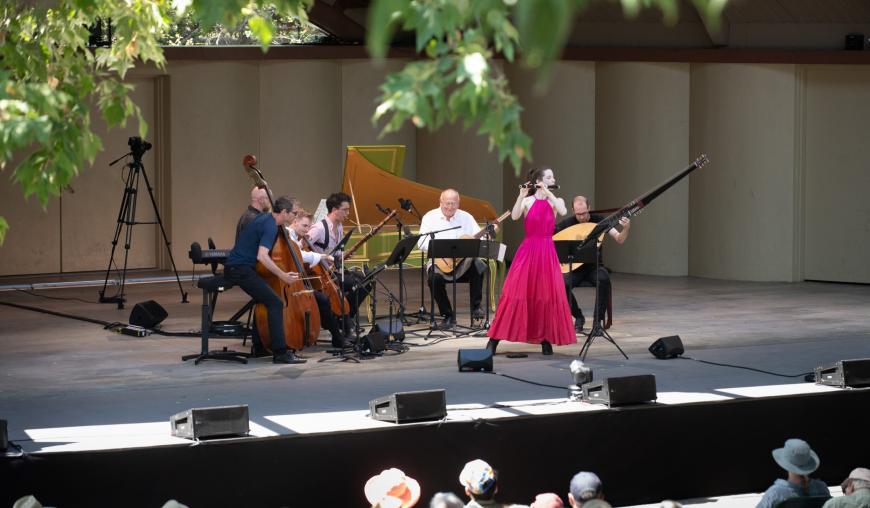
Then, like a cloud of Calvinist guilt, the mood was all but extinguished by the 257 repeated measures of Cassandra Miller’s About Bach for string quartet. To be fair, had the piece been performed in a more intimate (air-conditioned) setting, its series of crystalline repetitions might have succeeded brilliantly. But to be forced to endure it under the blazing sun was, as one audience member observed, “like being condemned to purgatory.”
A Family Dinner
When the members of AMOC gather at their farm, dinner is a communal ritual that begins with a prayer of thanks. So, it’s not surprising that one of the most eagerly awaited premieres of the festival was Matthew Aucoin’s Family Dinner, which would feature the full musical and vocal forces of AMOC.
From the initial chiming of bells that summons everyone to the table to a succession of mini-concerto “toasts,” Family Dinner is a multivoiced celebration. “What do you wish to say?” the host inquires, and the responses are wide-ranging, from poetic and profound to chit-chatty and raucous. These multiple personalities provide Aucoin a perfect opportunity to employ a wide variety of orchestral and vocal styles (both sung and spoken). Dinner with AMOC can feel like a movie, as it does in the movement “Meridian Response,” droll with New York sophistication in “Frank O’Hara’s Toast.” There’s even a wink to John Adams (who was in the audience and programmed last year’s festival), titled “Song of Gratitude to Be Back in California.”
Family Dinner offered Aucoin a chance to go for broke, to push the envelope, but he never really takes it. He’s a composer who seems to be always watching over his own shoulder to make sure he doesn’t take unnecessary chances and risk offense or criticism. It’s a self-protective shell he needs to break out of. And if there was ever an opportunity for Aucoin to run amok, this was it.
Last year’s 75th Ojai Festival celebrated the next generation of California, specifically Berkeley, composers. This year focused predominantly on East Coast academia. There was, however, one distinctly West Coast composition, Andrew McIntosh’s Little Jimmy. Its interpolation of natural-sound field recordings (made in the San Gabriel Mountains) evoked the spirit of John Luther Adams. Composed before and after the Bobcat Fire swept through the Little Jimmy campsite of the title, the work begins rhapsodically to the tones and overtones of bells, marimba, and string-bowed pianos. This first-movement idyll (with its recorded birdsong) suddenly gives way to a fire alarm of pounded metal sheets and the sense of an immolation of flames. A very different sense of place returns in the third movement, with recorded sounds McIntosh made after the fire as nature tries to heal.
Breaking Loose
All the audience knew was that they were invited to a free public concert Sunday called “Dance in the Park.” It would feature Julia Eichten and Bret Easterling dancing to The Danube Waves, by Ion Ivanovici. It was described as “a celebratory happening of tenderness, togetherness, and fiery joy.” No one could have imagined that Jurassic Park was about to come to Libbey Park.
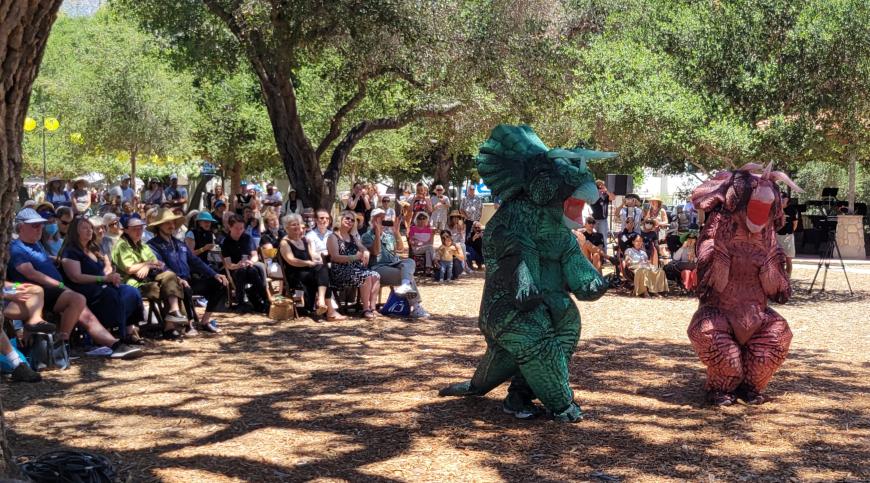
As the audience settled in beneath the spreading bows of an ancient oak, two gaily clad triceratops, one pink, one blue, slowly insinuated themselves into the audience. They sat behind patrons oblivious to their presence. But when one of the playful creatures ambled up to festival director Ara Guzelimian, a concerned security guard interposed himself, asking, “Is he supposed to be here?” What followed was a joyous, frolicking pas de deux of love, extinction, and human evolution — Charles Darwin meets Fantasia. It was an Ojai moment of the first order.
But that was just the beginning. At a second free event/ concert, the members of AMOC performed the world premiere of a rock opera on historical themes, Rome Is Falling, something “Paul McCartney-ish,” with music, lyrics, narration, and lead guitar riffs by Doug Balliett. This fully staged production featured the musicians and singers of AMOC, the world’s only period-instrument rock bank (Ruckus), and the Ojai Festival Children’s Choir. Think of it as Decline and Fall of the Roman Empire meets Jesus Christ Superstar, performed by Monty Python.
There was exuberant mugging from Davóne Tines, the soaring soprano of Ariadne Greif (filling in for Julia Bullock), and, fresh from his performances at the Metropolitan Opera in Philip Glass’s Akhnaten, countertenor Anthony Roth Costanzo as a Roman emperor with a fetish for chickens. It was all great fun.
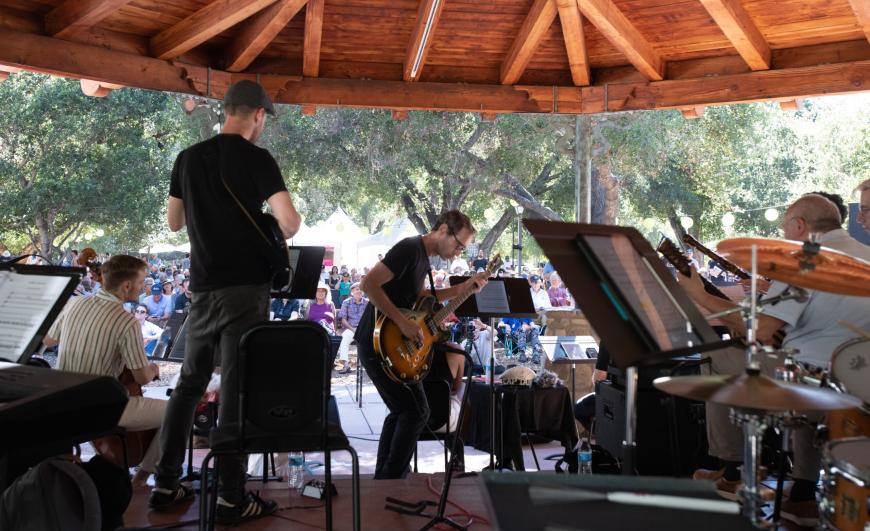
Sadly, the festival’s final concert was meant to feature Bullock singing She Is Asleep by John Cage and “Four Women” by Nina Simone. The cancellation of these works threw off the balance of a program that then relied too heavily on the inconsistent voice of Costanzo in a series of Baroque arias and Philip Glass excerpts.
But all’s well that ends well. To complete the concert, the entire ensemble of AMOC dancers came on stage for a performance of Franz Schubert’s “Ständchen” (from the company’s Open Rehearsal, directed by Bobbi Jene Smith). Then, with a reprise of Julius Eastman’s Stay on It, the dancers pranced arm-in-arm up the aisles and into the sunset. The 76th-annual Ojai Music Festival had come to an end.




